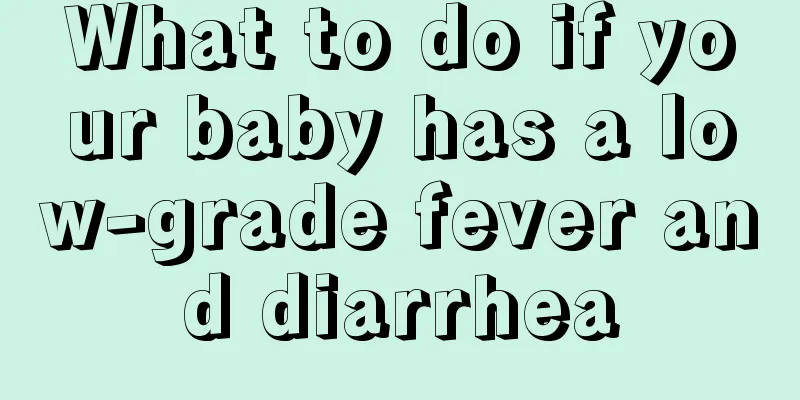What to do if your baby has a low-grade fever and diarrhea

|
When the baby is a few months old, his body is relatively weak and he is easily affected by the external environment and gets sick. In particular, weather changes and sudden temperature changes can easily cause the baby to catch a cold or have a fever. Therefore, most babies are prone to diarrhea at this time, and the frequency of diarrhea will be more frequent. If parents do not pay more attention at this time, the condition will worsen further. Therefore, parents need to take good care of their babies when they have diarrhea. Observing the stool characteristics of infants and young children can help us understand their digestion conditions. If the baby's stool has a strong smell, it means that the protein is not digested properly. At this time, you should reduce the amount of milk appropriately or dilute the milk. If there is a lot of foam in the stool, it means that carbohydrates are not digested properly, and you must reduce or even stop feeding starchy foods. If the stool looks creamy, it indicates fat malabsorption and the intake of fatty foods should be reduced. There are many reasons for diarrhea in infants and young children. If it is caused by non-infectious factors, such as improper diet or weather changes, it can cause diarrhea. Diarrhea caused by diet includes eating too much or too little; changes in food ingredients, adding too much sugar; adding complementary foods too quickly, causing discomfort, weaning children in hot weather, etc. Weather changes, such as children catching a cold, can cause intestinal dysfunction; hot weather can reduce the secretion of gastric acid and digestive enzymes, and indigestion can cause diarrhea. It is caused by infectious factors, such as unclean feeding utensils or food used by children, which allow bacteria to enter the body and cause diarrhea; long-term use of broad-spectrum antibiotics can cause intestinal flora imbalance and cause diarrhea; when children suffer from acute upper respiratory tract infection, pneumonia, otitis media, urinary tract infection, pharyngitis and other diseases, they can all develop diarrhea due to fever and the influence of pathogen toxins. For babies with low fever, try not to give them antipyretics or blindly give them antipyretic injections. These medical methods have a negative impact on the baby's immunity. Parents should pay attention to when the temperature of the baby's living environment is too high or too low. Because children's ability to self-regulate body temperature is limited, parents need to help their children keep warm or cool down accordingly. If you have a high fever, you should go to the hospital for treatment immediately. |
<<: Will the fetal movement be very strong when you are four months pregnant?
>>: Why does my baby sweat at night?
Recommend
The child's nose is always stuffy
Sometimes we find that children’s health is the m...
What should I do if my child has allergic rhinitis?
Allergic rhinitis is a common disease in daily li...
Why is the baby's scalp blue?
After becoming a mother, every move of the child ...
What are the antiviral drugs for children?
When choosing some special medicines, you need to...
What should I do if my two-week-old baby has cavities?
Tooth decay is a common dental disease among many...
Sleep time for three-year-olds
The sleep time in each time period is different. ...
What are the symptoms of a rash in children?
Generally, children will have a fever for several...
Treatment of a newborn baby with a fever of 38 degrees
Many of us are particularly susceptible to colds....
What should I do if my child gets chickenpox?
Varicella is a contagious skin disease. People ar...
Your baby has phlegm but can’t spit it out? 4 tips to teach you
The temperature drops in winter, which is a high-...
What should I do if my child is allergic to peaches?
How many types of peaches are there that we usual...
What should I do if my child gets a big swelling after being bitten by a mosquito?
Mosquitoes are very scary creatures in summer. Th...
What causes bad breath in children?
Bad breath is a very common phenomenon, but if yo...
How to treat chronic bronchitis in children?
When a child is sick, not only will the child be ...
Why does my baby cry at night?
We all know that babies are the hope of every fam...









